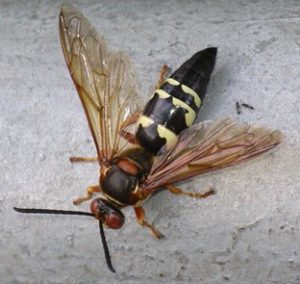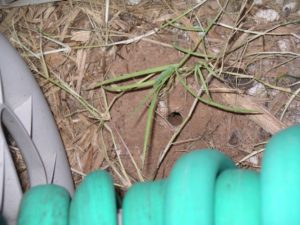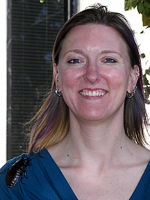What are these giant wasps?!?!?!?!

Cicada killer wasps, common this time of year, are native to Texas. They are some of the largest wasps that you can find in Texas, reaching up to 1 ½ inches long and can be somewhat frightening if you see them flying about your lawn.
Cicada killers have a reddish-brown head and thorax, a black and yellow abdomen, and wings with a rusty tinge. Only females are capable of stinging because the stinger is a modified egg laying structure.
Fortunately, female cicada killer wasps are rarely aggressive. Males look similar to females and are territorial. They will buzz near you if you enter their territory, but once you leave the male’s territory they ignore you.
Scary But Beneficial Garden Insect

This hole is a Cicada Killers nest.
Cicada killers are beneficial insects because they help to control cicada populations. Cicadas, the noisy insects of summer, are stung and paralyzed by female cicada killer wasps. They then carry the paralyzed cicadas back to a burrow that the wasp digs in the ground. The female wasp pulls the cicada into the burrow and tucks it into a side tunnel. Once there are 3-4 cicadas in the side tunnel, an egg deposited with the cicadas and the side tunnel sealed. When the egg hatches, the cicada killer larva eats the cicadas provided. The cicada killer wasp that is developing emerges the following year.
No Control Necessary
Cicada killers usually do not warrant any control methods. If someone is allergic to wasps, you can sprinkle insecticidal dust around the opening of the burrow. Tamp the dust around the opening with your shoe and as the wasps work on cleaning out the entrance to the burrow, they will pick up the dust on their body and eventually die.
Please note that cicada killer wasps are often mistaken for Asian giant hornets (AGH), also referred to as “murder hornets”. AGH have not been found in Texas and have only been located in Washington state within the U.S.
For more information or help with identification, contact Wizzie Brown, Texas AgriLife Extension Service Program Specialist.
About Wizzie

Wizzie Brown
County Extension Program Specialist – Integrated Pest Management
Email:EBrown@ag.tamu.edu
Wizzie has been with Texas A&M AgriLife Extension Service since 2002 and has been playing with insects since she was a toddler. She is an Extension Program Specialist with the Integrated Pest Management (IPM) program. Wizzie holds a B.S. in entomology from The Ohio State University and a M.S. in entomology from Texas A&M University. The integrated pest management program provides identification, biological and management information to whomever needs help. Wizzie’s research focuses on imported fire ants, including community wide fire ant management. Wizzie also is happy to provide programs to area groups on a variety of arthropod-related topics. You can find insect and other arthropod information on Wizzie’s blog.

